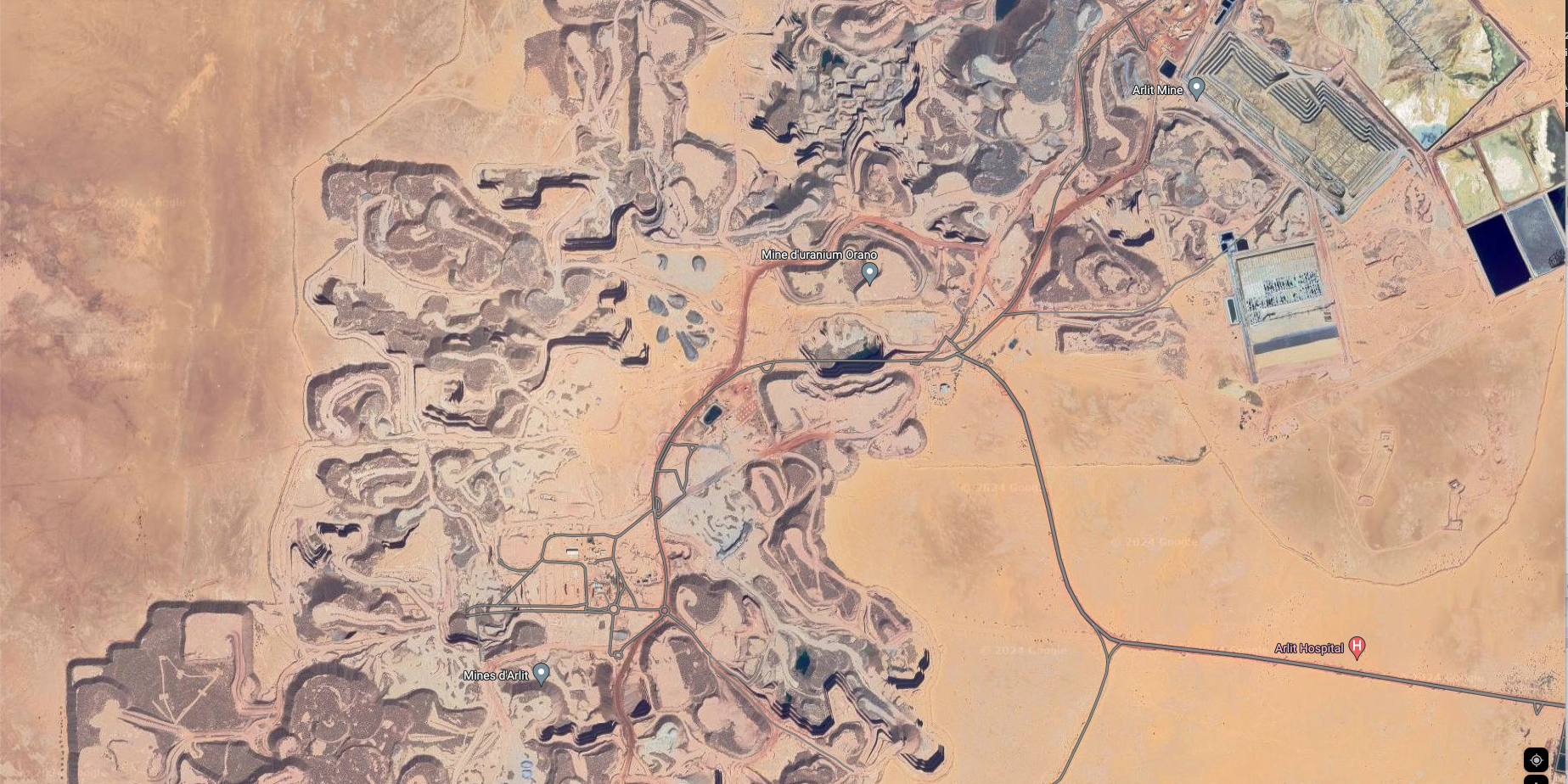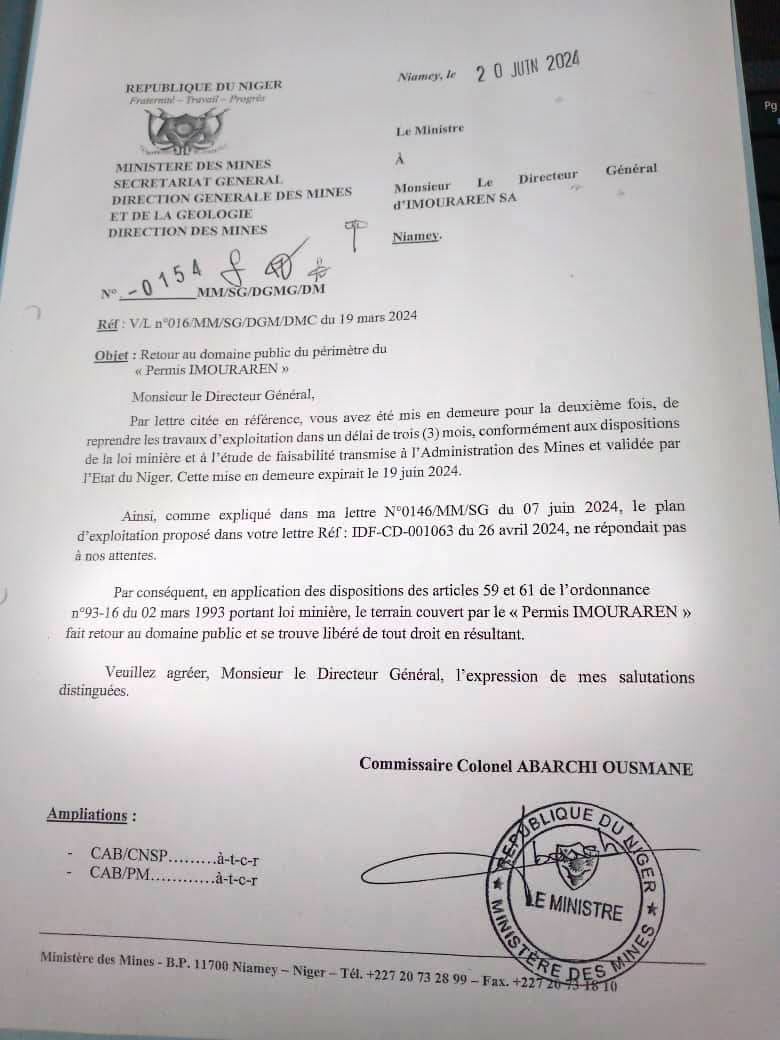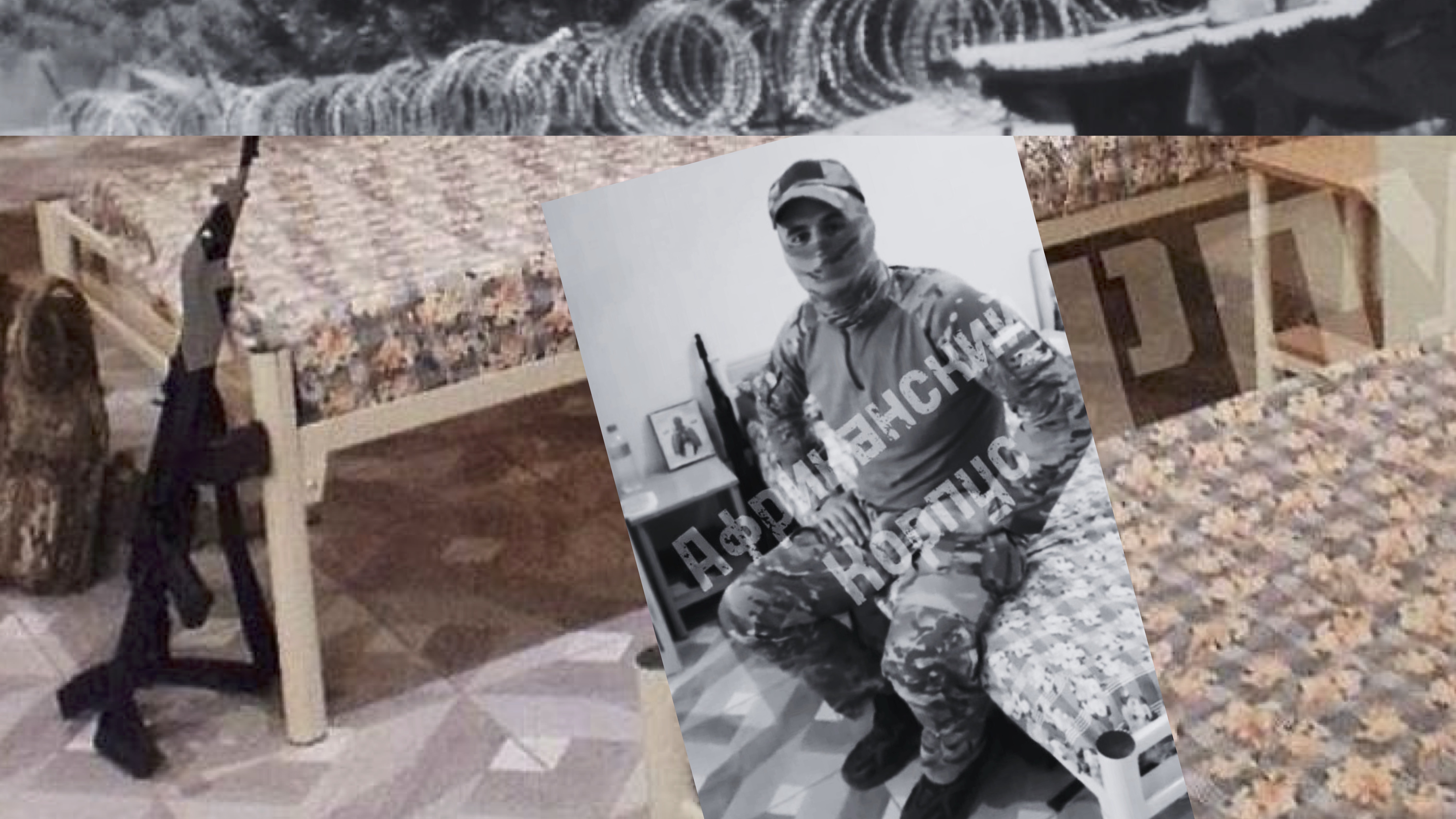Read the French version here.
“We must not replace a one-eyed horse with a blind horse”
Sunday April 21, 2024. Agadez, in central Niger, is a large urban area with houses mostly built of ochre earth. There are very few trees here in this poor town, located more than 900km northeast of the capital. In the evening, the city is full of young idlers, drug addicts, and sex workers. Many of them are migrants. “These young people come from other regions to look for gold in the desert! Unlucky and disappointed by life, they are afraid of returning home with the impression of having failed, that is why they stay in Agadez and do all these things,” says Abdellah, a young teacher who is showing me around the city.
My companion rejoices at the idea that a march against the Americans will take place in two days — against “Western imperialism”, as he calls it, which according to him is the source of all evil here. Agadez is home to American Base 201 with more than 1,000 men, all American soldiers.
Two days later, at noon, the thermometer already reads 45°C. Despite the heatwave, the streets are crowded with people chanting slogans hostile to the American military presence in the city. Their faces are weathered with anger, their bodies sweating. The demonstrators brandish anti-American banners. Among them, three young people stand aside. They soak a fabric in the colours of the American flag with gasoline before setting it on fire. Quickly surrounded by dozens of other people, the crowd begins shouting: “Down with America! Down with France!”
The ulema calls for a break with the “satanic” West
On a vehicle, deafening speakers broadcast a hit by Ivorian singer Alpha Blondy. “French Army! Leave us… We no longer want you… We no longer want false independence under close surveillance…” At the municipal tribune of Agadez, which is the site of the protest, regional authorities and customary and religious dignitaries are waiting in full force. The speech of a well-respected ulema (religious scholar) calls for a total break with “satanic” Western countries. Brigadier General Ibra Boulama, governor of Agadez, congratulates the demonstrators. “This is proof that you are truly committed to the sovereignty of our country! You are sending a strong signal to those who think they can one day return and recolonise Africa by force!” His words are greeted with cries of joy.
Social networks helped prepare the atmosphere ten days earlier in Niamey, the capital. But besides the fabricated social media campaigns, Nigeriens have long felt real anger against the French coloniser, against the previous French-supported regime, and against the West in general. “The old regime? What have they done for the poor? Billions of FCFA were embezzled with the knowledge of the leaders, but political power prevented them from being prosecuted,” protests Marouma, 45, a civil society activist and fierce defender of the military in power.
Most Nigeriens remember very well that, under civilian president Issoufou Mahamadou, an audit in February 2020 revealed the existence of a vast network of economic operators having overcharged orders for equipment intended for the army. Several orders for an amount of FCFA 76 billion (around US$125 million) were paid for and not even delivered. This case has not been judged to date.
Nigerien civil society has often stressed that a real fight against systemic corruption within the state cannot consist of mere promises, such as made by Mahamadou’s successor, the last civilian president Bazoum, replaced by the junta in 2023.
Dust and pollution
France’s nuclear exploitation of Niger’s uranium wealth also constitutes an acute trauma for many. ICON, a civil society organisation, recently released a report criticising the way French nuclear mining company Orano got Niger to “redirect” a promised investment, forgiving debt of more than a billion dollars from its subsidiary Imouraren, while reneging on its commitments of US$43 million in social responsibility projects.
This agreement felt like a slap in the face after a long fight by civil society for a real Nigerien-French partnership in the mining sector. Activist Salifou Manzo believes that the previous regime proved that it was more loyal to Orano than to its citizens by “signing the waiver of all of Imouraren’s debt to consolidate the company’s financial situation.”
“If we are the poorest country on the planet, it is simply because France wanted it! Areva, now Orano, has been exploiting Niger’s uranium for almost 50 years, but what has Niger honestly gained? Nothing but dust and pollution! More than 30% of Orano’s uranium comes from the Somaïr and Cominak mines, where we suffer from a lack of water, a lack of electricity, and human and environmental pollution. We are irradiated here,” Almoustapha Alhacen, president of the NGO Aghirman and winner of the 2017 International Prize for a Nuclear-Free Future, says angrily during our interview in May 2024 in Arlit, northern Niger.
“We are irradiated here”
The French relocation of its Barkhane military force from Mali to Niger, fully approved by Parliament in 2022, added insult to injury. Many people in Niger felt that the French were not taking the fight against the terrorists seriously, often reporting that several terrorist attacks were carried out despite warnings from villagers. No help arrived in time — it was always after the massacre that reinforcements came. Anti-French campaigns on social media fueled these feelings, even going so far as to claim that France protects and arms terrorists. “It’s a real betrayal,” in the words of Issaka Ali, a fiercely anti-French thirty-year-old trade unionist, referring to the Barkhane move. “France is behind all our problems”
There are some who have come to believe that the country should negotiate with the terrorists and find different solutions. “It’s our children who are recruited because they have nothing to do,” says Elhadj Hama, a village chief who has taken refuge in the city due to insecurity. “There is a new leader in the region of Moroccan origin who is very good at preaching. He rallies our children to his cause through religion.”
But the activists of Agadez see in the coup d'état of July 26, 2023 the panacea for all their ills. People hope that there will be no more hunger, no more thirst, no more insecurity, no more unemployment. “As France left (in 2023) and the Americans will follow them, we will now be masters of our wealth. We will sign new contracts that are more beneficial for our country,” predicts young Abdellah. The Russians could soon replace the Americans at Base 201. But no one here seems particularly worried about that.
Brand new weapons
The main military base, 101, in Niamey, occupied a few months ago by the French and Americans, had already welcomed a contingent of Russian soldiers on April 13, while the city was experiencing the same demonstrations that I just witnessed in Agadez. “It was late at night that their plane landed on the runway of the Niamey Escadrille. At first, we all didn’t know why the command had asked us to be there. It wasn’t until the big plane landed that we found out. We had spent several hours together, Nigerien and Russian soldiers, unloading the war materiel that the cargo ship was carrying. The weapons of these Russians are new. There were almost a hundred of them and some spoke French well,” confides a young Nigerien soldier at the Sky Lounge bar-restaurant in Niamey. Under the euphoria of alcohol, he says that he is very happy with the weapons. “We need this.”
The price of a bag of rice has doubled
During the 900km bus ride to Niamey, the reality of Niger and the challenges ahead have been all too evident in the tense conversations among the passengers, very different from those of the young activists in Agadez. My travelling companions talk about the cost of living, growing insecurity, jihadist terrorism affecting more and more villages. About France and the USA, Russia and Iran. Bad roads, completely degraded in places. The absence of any investment in the north. The ongoing repair work that had stopped after the putsch. The contracting company that had packed up. “Really, this coup d’etat has delayed us a lot, especially the two regions of Agadez and that of Tahoua,” confides a fifty-year-old.
Outside, the drought has been in full swing, with animals searching in vain for pastures and women lining up in front of wells that were drying up or were already dry. “The price of a bag of rice has doubled, going from FCFA 10,000 (US$16) before the fall of (former president) Bazoum to FCFA 20,000 today,” a restaurateur I meet at the rest stop in the town of Dogondoutchi tells me. “It is becoming a luxury.”
I remember the words spoken by Almoustapha Alhacen at the end of our conversation on Niger’s unfortunate nuclear partnerships. “It doesn't matter if we want to change partners, but we have to be careful. Changing a one-eyed horse for a blind horse is of no use.”
“Our true friend is Putin”
After 18 hours of driving, upon arrival in Niamey, the images have changed. The flags of the three countries of the Alliance of Sahel States are now visible at roundabouts. I recognise a fourth flag: that of the Russian Confederation. “This one is from the country of our true friend, Vladimir Putin,” the taxi driver tells me happily. Just as happy, Nouhou Arzika, president of the MPCR, a civil society movement close to the military junta, speaks to me about his hopes and dreams shortly after. “Now everyone is talking about Niger,” he emphasises.
New masters
Of course, the arrival of the Russians had been planned for a long time. “Our new masters (the putschists) had clearly announced that they wanted to review the agreements establishing foreign military presences in the country,” says sociologist and political scientist Souley Adji, when I meet him here in Niamey. “You will remember that in December 2023, a Russian delegation led by Colonel Yunus-Bek Yevkurov, Deputy Minister of Defense, came to Niamey to strengthen military cooperation with Moscow. Secret agreements were then discussed between the two countries.” Other sources confirm that the Russian visit to Niamey was followed by that of Nigerien Prime Minister Mahaman Ali Lamine Zeine to Moscow in January 2024, and that agreements on arms, intelligence, and military men materialised then.
“Niger (now) receives tons of military equipment from Moscow via the Libyan ports of Tobruk and Sirte which are then transported by cargo flights to Niger,” says a former close collaborator of the deposed regime, since resettled in Libya. “The Nigerien military junta is in contact with Russia through Saïd Sadam, son of General Haftar who has stayed in Niger several times. With a Niger-Algerian facilitator named Aghaly Alambbo, appointed in October 2023 as special advisor to President Tchiani, Saïd Sadam forms the link between Niger and Russia.”
Rosatom
All this is because, says a highly placed source in the Nigerien ministry of mines, the Russians are interested in Niger’s uranium mines. “They’re almost guaranteed to get them. And this will happen in the days and weeks to come, after Niger ousts Orano.” Only a few weeks after this interview, on June 11, the Minister of Mines of Niger sent a letter of formal notice to Orano, withdrawing its permit for the Imouraren uranium mine. Orano subsequently confirmed the notice on its website in Niger. It also indicated on its website that it remains prepared “to keep open all channels of communication with the Nigerien authorities” and that it “reserves the right to challenge the decision before the competent national and international judicial authorities.”
But whether the company jumps high or low, the Imouraren permit “will surely soon be awarded to Rosatom, the Russian federal atomic energy agency, or alternatively to Adur Medencilik of Turkey,” our source believes.

The air conditioning only works for four hours
At the hotel, unexpected power outages in the air conditioning keep guests awake. The heat and mosquitoes bother people, but their complaints to the manager are in vain: “I have already emptied two generators. I don’t have enough money to pay for fuel every four hours.” This is a novelty, probably a consequence of the sanctions imposed on Niger by neighbouring countries after the putsch.
The next day, it is more difficult than ever to convince the population of Niamey to express themselves freely on the choice of the Russians as new military partners. People I have appointments with cancel at the last minute or don’t show up. “We must be wary, the junta has many moles in the circle of civil society actors. They had a lot of people arrested,” Nasser, 30, a law student at the University of Niamey, advises me.
The cow or your son
The great hope of Nigeriens for the Russian presence was that terrorism would finally be fought more decisively than the French had done. But according to a refugee named Ousmane, originally from Goungo Koré, a village located three kilometres southwest of Ayorou, the scourge is only getting worse. “We can no longer stay in the villages because of insecurity,” he says. “My whole village is displaced. We all fled the abuses of terrorists. They came in broad daylight and surrounded our village. They asked for money and those who didn’t have it gave cows or sheep. If the family has neither money nor animals, the father must give his son to join the ranks of terrorists.”
“These Russians don’t have an ounce of pity”
Later, still looking for sources in Niamey, I meet an ex-politician from the former ruling party, now without a position and speaking anonymously for fear of arrest. He is frustrated, and not just by the loss of his prestige and privileges. “What right do these putschists have to bring these Russian soldiers to us? The junta deceives the people with a speech to warm up their patriotism in the name of sovereignty, and with another speech it sells it to other foreigners at the price of a few obols of wheat. I tell you that these people (the Russians) have no ounce of pity. They easily demonstrate it in northern Mali where they terrorise, rape, and massacre innocent men, women, and children. It’s regrettable!”
The old politician may be right. On May 28, 2024, nine villagers were reportedly shot dead in Sigindey Balley Koira, near the village of Tafague, not far from the capital. According to Intinicar Alhassane, president of the Party for Peace and Development Akal-Kassa, who announced the news of the massacre to the media, nine herders from the Tuareg and Peulh communities were arrested for the first time at 7:14PM in the hamlet of Sigindey Balley Koira, then executed in their home “by our defence forces and their supporters, leaving behind ten widows and 55 children.” Only a few days after this news item, I learn of Intinicar's arrest.

Requests for comment were sent to Niger's military government spokesperson, who responded by sending ZAM a clip from an event celebrating the formation of the Alliance of Sahel States.
*The author’s name has been changed for safety reasons
Read all the investigative articles in this series:
Hôtel Kremlin | Niger (French)
Hôtel Kremlin | Mali (English)
Hôtel Kremlin | Burkina Faso (English)
Hôtel Kremlin | Burkina Faso (French)
Hôtel Kremlin | Niger, Mali, Burkina Faso (English)
Hôtel Kremlin | Niger, Mali, Burkina Faso (French)
Call to Action
ZAM believes that knowledge should be shared globally. Only by bringing multiple perspectives on a story is it possible to make accurate and informed decisions.
And that’s why we don’t have a paywall in place on our site. But we can’t do this without your valuable financial support. Donate to ZAM today and keep our platform free for all. Donate here.


